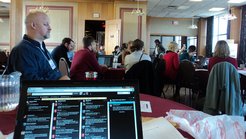 My job is to care about the business case for social media. That’s what I do for a living. Put social media in the perspective of a brand or company and do my best to illustrate how it can build a business.
My job is to care about the business case for social media. That’s what I do for a living. Put social media in the perspective of a brand or company and do my best to illustrate how it can build a business.
But if I never manage to definitively prove some fancy formula for “social media ROI” in a business context, I’ll still be here. Why? Because there are personal rewards to participation here that go above and beyond awareness, or sales, or anything of the sort.
I have met friends through whom I’ve rediscovered the meanings of trust, faith, and loyalty.
I’ve found a home for some of the personal battles I’ve fought, and solidarity through hearing the stories of others.
I have seen people raise money and awareness for causes that deserve more than we can ever collectively give them, but that might not otherwise stood a chance of getting seen.
I’ve seen the weak find strength in the voices and actions of others.
I’ve laughed more richly and more genuinely than I have in a long, long time.
I’ve walked into rooms and hugged people as if I’ve known them for decades, thanks to the late night chats on Twitter or a string of discussion on a blog. And I’ve shared drinks or dinner with many of those people and forged bonds of forever friendship that started on these “silly” social networks. We may have found one another on the web, but that’s just the spark that lit the fire.
I’ve reconnected with friends who I’ve always regretted losing track of, and I’ve been able to apologize for that in person. I’ve seen people closest to me rediscover the love of their lives many years later and forge a future together because of a serendipitous click.
We used to be bound by geography and circumstance in order to encounter people. Now, our potential for connection – and our ability to do so regardless of where we are or where we go – is amplified many times over, and more fluid and unencumbered than it’s ever been.
There are skeptics and naysayers all over. There are the “yeah, but”s of the world masquerading as pragmatists or realists when they’ve really got a perspective or attitude problem of their own. There is always the other side of the coin. But I choose to focus my energy elsewhere, because I’ve personally experienced how these relationships have enriched my life, my work, and my perspective on the world around me.
I will and do support the idea that quantifying social media’s impact is important to justify continued investment as a business. But I can’t believe nor understand how many companies can’t also accept the fact that deeper and broader personal connections can net stronger business ties, too, whether or not you can capture the data proof points that bear that out. It’s been that way since the dawn of time. We prosper in business through better connections, stronger relationships, deeper trust. We’ve always known that. We’ve rarely demanded to see the evidence until we got all up in arms about the fact that we were talking on this internet thing instead of over the golf course or a drink.
But I’ve found all of these things in spades through Twitter, my blog, the blogs of others, Facebook. I’ve found them in you, friends and readers and those that have provided so much information and insight for me to learn from. I’ve made business deals, yes. Numbers of them. But I’ve also exponentially enriched my life through the people I’ve met, the ideas I’ve discovered, the learning I’ve done.
I’ve found personal gold here on these crazy places on the web, simply because they give me potential. They give me personal inertia. They’ve brought me the gifts of people and friendships that will last long beyond the wires that first connected us.
That’s my personal social media ROI. What’s yours?
Amber Naslund


 “Twitter users are the most influential consumers online,” concludes Exact Target in the research report
“Twitter users are the most influential consumers online,” concludes Exact Target in the research report  It was Rory Kinnear who reminded me of transformational language this week. No, sadly not over a chummy brandy and ginger backstage at the National; I simply saw
It was Rory Kinnear who reminded me of transformational language this week. No, sadly not over a chummy brandy and ginger backstage at the National; I simply saw 
 Last Friday I had the distinct opportunity to attend, present and mingle with some of the “who’s who” of social media at UnGeeked Toronto, a three day social media retreat. The speaker list was extensive and reflective of the professionally social atmosphere. Guest speakers included:
Last Friday I had the distinct opportunity to attend, present and mingle with some of the “who’s who” of social media at UnGeeked Toronto, a three day social media retreat. The speaker list was extensive and reflective of the professionally social atmosphere. Guest speakers included: Mark Bowden
Mark Bowden  Jeffrey Willinger
Jeffrey Willinger  Karima-Catherine
Karima-Catherine  Election Day is over here in the United States and we appear to be on the brink of a significant social change. Fueled by outrage over the financial meltdown, economic stimulus attempts, government bailouts, and the election of Barack Obama, The Tea Party Movement is upending incumbents in the name of fiscal conservatism.
Election Day is over here in the United States and we appear to be on the brink of a significant social change. Fueled by outrage over the financial meltdown, economic stimulus attempts, government bailouts, and the election of Barack Obama, The Tea Party Movement is upending incumbents in the name of fiscal conservatism.